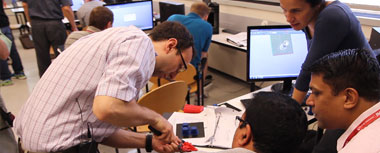Short Programs
Synthetic Biology
This course is in development for the future.
The below description should be taken as an example of content and is subject to change.
If you are interested in this course, please
sign up for email updates and/or check this course page at a later date.
Course Summary | Learning Objectives | Who Should Attend | Program Outline | Location | Updates
Course Summary
Synthetic Biology is an emerging technology that hopes to further develop biology as a substrate for engineering by adapting concepts developed in other fields of engineering. Foundational tools to meet this challenge include: ready access to off-the-shelf standardized biological parts and devices; a reliable and defined cellular chassis in which engineers can assemble and power DNA programs; and computational tools as well as measurement standards that enable the ready integration of simpler devices into many-component functional systems. By applying these engineering foundations to the richness and versatility of biology, some of the world’s most significant challenges can be addressed. For example advanced genome, protein and pathway redesign, metabolic engineering and cell-programmed therapeutics have already benefited from the tools of synthetic biology, and these developments will serve as the point of departure for many of the foundational topics. As synthetic biology matures into a robust engineering discipline, it should be capable of transforming the biotechnology, pharmaceutical, and chemical industries as well as suppliers of biotechnology tools, reagents, and services. This summer course offers an unprecedented opportunity to learn about this emerging field from its leaders as well as engage in hands-on computational and laboratory work using the latest tools and techniques.


![]() Fundamentals: Core concepts, understandings and tools (30%)
Fundamentals: Core concepts, understandings and tools (30%)
![]() Latest Developments: Recent advances and future trends (30%)
Latest Developments: Recent advances and future trends (30%)
![]() Industry Applications: Linking theory and real-world (20%)
Industry Applications: Linking theory and real-world (20%)
![]() Other: Hands-on laboratory work (20%)
Other: Hands-on laboratory work (20%)


![]() Lecture: Delivery of material in a lecture format (50%)
Lecture: Delivery of material in a lecture format (50%)
![]() Discussion or Groupwork: Participatory learning (30%)
Discussion or Groupwork: Participatory learning (30%)
![]() Labs: Demonstrations, experiments, simulations (20%)
Labs: Demonstrations, experiments, simulations (20%)


![]() Introductory: Appropriate for a general audience (20%)
Introductory: Appropriate for a general audience (20%)
![]() Specialized: Assumes experience in practice area or field (30%)
Specialized: Assumes experience in practice area or field (30%)
![]() Advanced: In-depth explorations at the graduate level (50%)
Advanced: In-depth explorations at the graduate level (50%)
Learning Objectives
By completing this short course, participants will:
- Understand the motivation for and increased importance of making biology easy to engineer
- Grasp how foundational tools from mature engineering disciplines were game-changers in those fields and how they might be applied to the engineering of biology
- Identify aspects of biotechnology that inhibit and enable the faster, more reliable programming of natural systems
- Gain familiarity with a common vocabulary useful for synthetic biology (e.g. standard part, chassis, etc.)
- Analyze and apply an abstraction hierarchy to the design of biological systems
- Have knowledge and direct experience with state-of-the art computational approaches to protein and biocircuit design
- Appreciate current and future application spaces for synthetic biology
- Identify current scientific, engineering, and regulatory bottlenecks in the field
- Experience some fundamental laboratory approaches for engineering biology
- Have knowledge of the latest published literature in the field and insight into ongoing research
Who Should Attend
This course is targeted for industrial leaders, in particular those in biotechnology, pharmaceutical, and chemical industries as well as suppliers of genetic tools and custom DNA synthesis companies. This course will also be of keen interest to professionals within regulatory agencies (e.g. FDA, USDA, EPA) in anticipation of technical decisions that will be faced as the products of synthetic biology come to trial and market. The class will also benefit academics with an interest in the latest advances related to biological, chemical and metabolic engineering. Members of civil society organizations and the public may also wish to consider the class as an intensive primer by which to gain access to the latest advances in synthetic biology.
Outline of the course
Day 1: Introduction to the Engineering of Biological Systems
Topics will include:
- Biological Engineering and Synthetic Biology
- Computer Science and Synthetic Biology
- Lab: day 1
Day 2: Biological Standards
Topics will include:
- Engineering Principles for Parts and Devices
- Measurement Standards
- Re-design of Cellular Chassis
- Lab: day 2
Day 3: Computation
Topics will include:
- Principles of Protein and Pathway Engineering
- Computational Re-design of Proteins
- Lab: day 3
Day 4: Applications and Implications
Topics will include:
- Optimization of Microbial Chemical Factories
- Re-design of Metabolic Pathways
- Standards of Practice
- Lab: day 4
Day 5: Summary and Future Directions
The final day of the class will cover concepts and emerging thinking on several advanced topics as well as evaluation of content delivered.
Note: Various case studies and examples will be used throughout the course to highlight concepts or demonstrate current applications of synthetic biology. Participants do not require in-depth knowledge of these cases studies for lectures or the exercises, but basic molecular biology and cell biology knowledge is assumed. Participants who are able to bring laptops to the class are encouraged to do so. Others will be provided with laptops to complete the in-class exercises.
Location
This course takes place on the MIT campus in Cambridge, Massachusetts. We can also offer this course for groups of employees at your location. Please contact the Short Programs office for further details.
Updates
There are no updates at this time.


